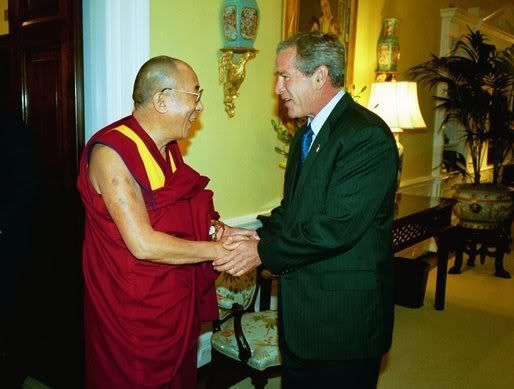 David Seaton's News Links
David Seaton's News LinksThe Dalai Lama is a great spiritual leader, I follow his discourses with great interest, indeed reverence. However, as a chief of state, I can't see that he is a great example of the democratic principals that George W. Bush says he is committed to bringing to the world with fire and the sword.
As I understand it Tibet's chief of state is chosen when a group of monks show a child personal effects of the last chief of state and if he recognizes them as his own, then he becomes the new chief of state... Come to think of it, that's not a whole lot different to the way Bush got to chief of state himself. Still I don't see why it was absolutely necessary to offend China on democratic principals. Because China is in a position to express its displeasure in many interesting ways.
People who understand money tell me that there is a liquidity crisis in the world, a rather desperate shortage of cash.
China has a huge amount of cash. They want to invest it in the west. It seems to me that this information doesn't square with the photo above.
In the same way I don't understand the timing of the Armenian genocide vote in the US Senate, I don't understand the timing of the photo above. Somebody is going to end up being humiliated and I don't think it's going to be the Chinese. DS
Martin Wolf: The brave new world of state capitalism - Financial Times
Abstract: Globalisation was supposed to mean the worldwide triumph of the market economy. Yet some of the most influential players are turning out to be states, not private actors. States play a dominant role in ownership and production of raw materials, notably oil and gas. Now states are also emerging as owners of wealth. This is creating widespread concern. Does that narrow focus make sense? The broad answer is No.(...) In all, they control some $2,200bn, with $2,100bn in the top 20 funds. The seven biggest belong (in order of estimated size) to Abu Dhabi ($625bn), Norway ($322bn), Singapore – GIC ($215bn), Kuwait ($213bn), China ($200bn), Russia ($128bn) and Singapore – Temasek ($108bn).(...) The sovereign funds remain far smaller than official foreign currency reserves (approximately $5,600bn). But the expectation is that these funds will grow rapidly, possibly to exceed official currency reserves in a number of years. If recent growth were to continue, the total value would reach $13,000bn over the next decade. This might then be 5 per cent of total global financial wealth.(...) Many sovereign wealth funds should raise no concerns whatsoever. The worrying ones are only those that do seek dominant positions or outright ownership of strategically important businesses. If the fund belonged to a government deemed potentially hostile, the concern must be bigger. It would be reasonable to keep control of companies operating in defence or high technology out of the ownership of funds belonging to any foreign government, let alone a potentially hostile one. But interesting questions arise elsewhere: what would people feel about Chinese government ownership of a big media operator?(...) the owners of the sovereign wealth funds need to understand their own best interests. They should manage their money professionally and transparently. This is also the way to minimise friction with host countries. If they refuse to abide by these principles, they must expect trouble. Yet trouble should not go out of its way to look for them: far, far worse things can happen than for China to come to the west bearing the chequebook it has earned by its people’s remarkable efforts. READ IT ALL
No comments:
Post a Comment